Financial Accounting Report: Role of Accounting in the GFC
VerifiedAdded on 2020/03/16
|7
|2130
|37
Report
AI Summary
This report provides a comprehensive analysis of the Global Financial Crisis (GFC) of 2007-2008, focusing on the pivotal role of accounting standards. It examines how fair value accounting contributed to the crisis, highlighting the manipulation of financial statements and the subsequent economic consequences. The report details the actions taken by the International Accounting Standards Board (IASB) and the Australian Accounting Standards Board (AASB) in response to the crisis, including improvements to off-balance sheet items, new disclosure requirements, and efforts to address accounting issues globally. The report contrasts previous accounting standards with current ones, pointing out the issues of high costs, financial manipulation, and lack of global acceptance. It concludes by emphasizing the importance of accounting standards in preventing future financial crises and the ongoing efforts of accounting boards worldwide to mitigate the impacts of such events.
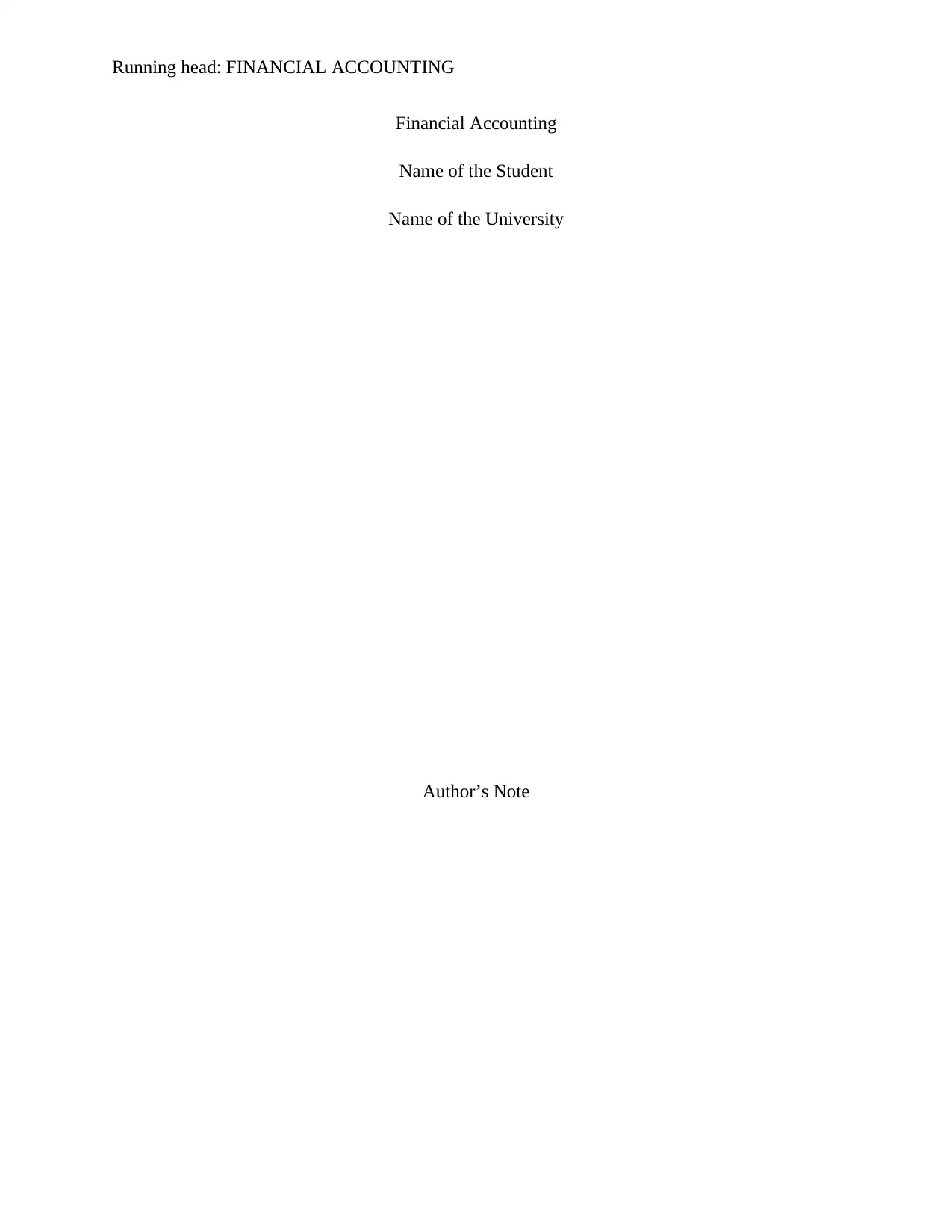
Running head: FINANCIAL ACCOUNTING
Financial Accounting
Name of the Student
Name of the University
Author’s Note
Financial Accounting
Name of the Student
Name of the University
Author’s Note
Paraphrase This Document
Need a fresh take? Get an instant paraphrase of this document with our AI Paraphraser
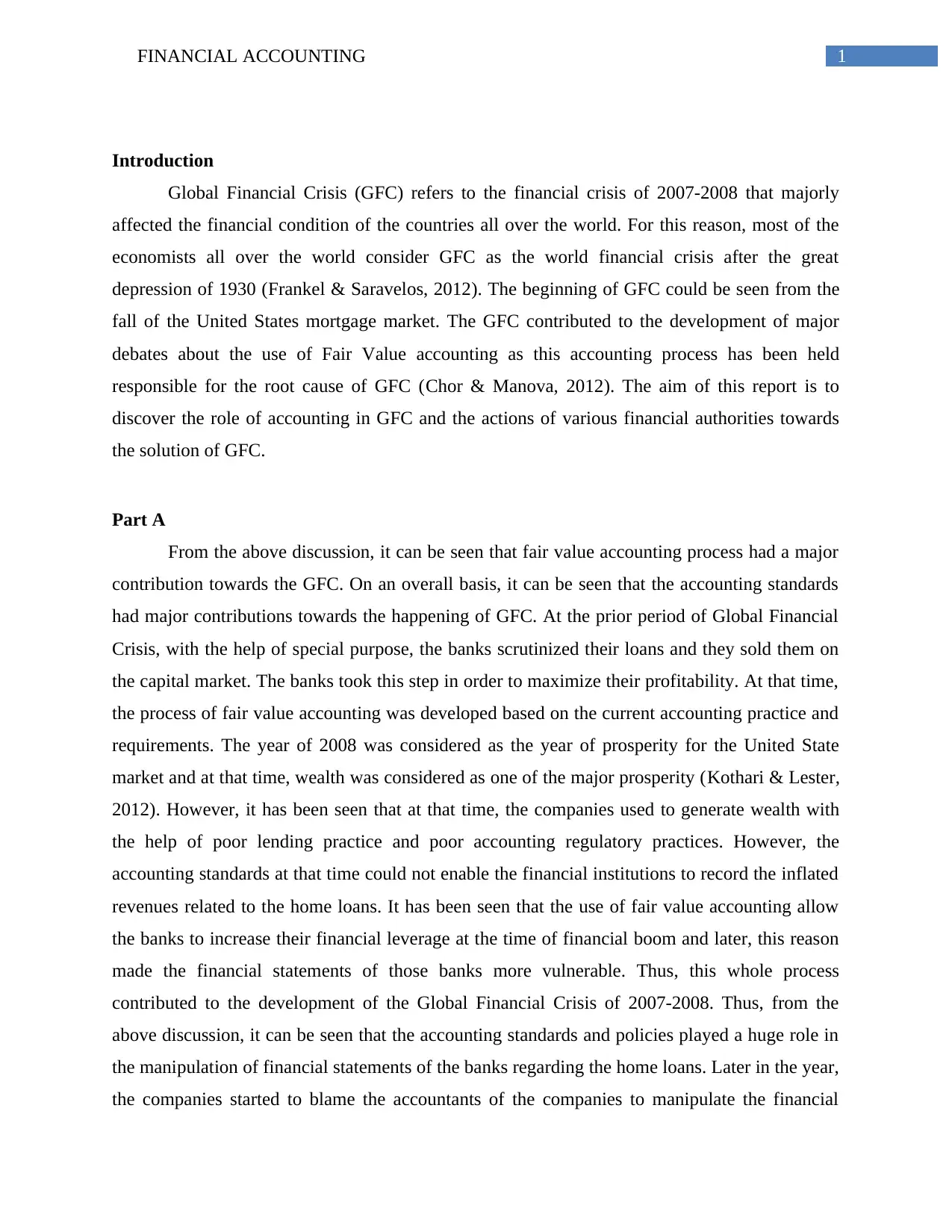
1FINANCIAL ACCOUNTING
Introduction
Global Financial Crisis (GFC) refers to the financial crisis of 2007-2008 that majorly
affected the financial condition of the countries all over the world. For this reason, most of the
economists all over the world consider GFC as the world financial crisis after the great
depression of 1930 (Frankel & Saravelos, 2012). The beginning of GFC could be seen from the
fall of the United States mortgage market. The GFC contributed to the development of major
debates about the use of Fair Value accounting as this accounting process has been held
responsible for the root cause of GFC (Chor & Manova, 2012). The aim of this report is to
discover the role of accounting in GFC and the actions of various financial authorities towards
the solution of GFC.
Part A
From the above discussion, it can be seen that fair value accounting process had a major
contribution towards the GFC. On an overall basis, it can be seen that the accounting standards
had major contributions towards the happening of GFC. At the prior period of Global Financial
Crisis, with the help of special purpose, the banks scrutinized their loans and they sold them on
the capital market. The banks took this step in order to maximize their profitability. At that time,
the process of fair value accounting was developed based on the current accounting practice and
requirements. The year of 2008 was considered as the year of prosperity for the United State
market and at that time, wealth was considered as one of the major prosperity (Kothari & Lester,
2012). However, it has been seen that at that time, the companies used to generate wealth with
the help of poor lending practice and poor accounting regulatory practices. However, the
accounting standards at that time could not enable the financial institutions to record the inflated
revenues related to the home loans. It has been seen that the use of fair value accounting allow
the banks to increase their financial leverage at the time of financial boom and later, this reason
made the financial statements of those banks more vulnerable. Thus, this whole process
contributed to the development of the Global Financial Crisis of 2007-2008. Thus, from the
above discussion, it can be seen that the accounting standards and policies played a huge role in
the manipulation of financial statements of the banks regarding the home loans. Later in the year,
the companies started to blame the accountants of the companies to manipulate the financial
Introduction
Global Financial Crisis (GFC) refers to the financial crisis of 2007-2008 that majorly
affected the financial condition of the countries all over the world. For this reason, most of the
economists all over the world consider GFC as the world financial crisis after the great
depression of 1930 (Frankel & Saravelos, 2012). The beginning of GFC could be seen from the
fall of the United States mortgage market. The GFC contributed to the development of major
debates about the use of Fair Value accounting as this accounting process has been held
responsible for the root cause of GFC (Chor & Manova, 2012). The aim of this report is to
discover the role of accounting in GFC and the actions of various financial authorities towards
the solution of GFC.
Part A
From the above discussion, it can be seen that fair value accounting process had a major
contribution towards the GFC. On an overall basis, it can be seen that the accounting standards
had major contributions towards the happening of GFC. At the prior period of Global Financial
Crisis, with the help of special purpose, the banks scrutinized their loans and they sold them on
the capital market. The banks took this step in order to maximize their profitability. At that time,
the process of fair value accounting was developed based on the current accounting practice and
requirements. The year of 2008 was considered as the year of prosperity for the United State
market and at that time, wealth was considered as one of the major prosperity (Kothari & Lester,
2012). However, it has been seen that at that time, the companies used to generate wealth with
the help of poor lending practice and poor accounting regulatory practices. However, the
accounting standards at that time could not enable the financial institutions to record the inflated
revenues related to the home loans. It has been seen that the use of fair value accounting allow
the banks to increase their financial leverage at the time of financial boom and later, this reason
made the financial statements of those banks more vulnerable. Thus, this whole process
contributed to the development of the Global Financial Crisis of 2007-2008. Thus, from the
above discussion, it can be seen that the accounting standards and policies played a huge role in
the manipulation of financial statements of the banks regarding the home loans. Later in the year,
the companies started to blame the accountants of the companies to manipulate the financial
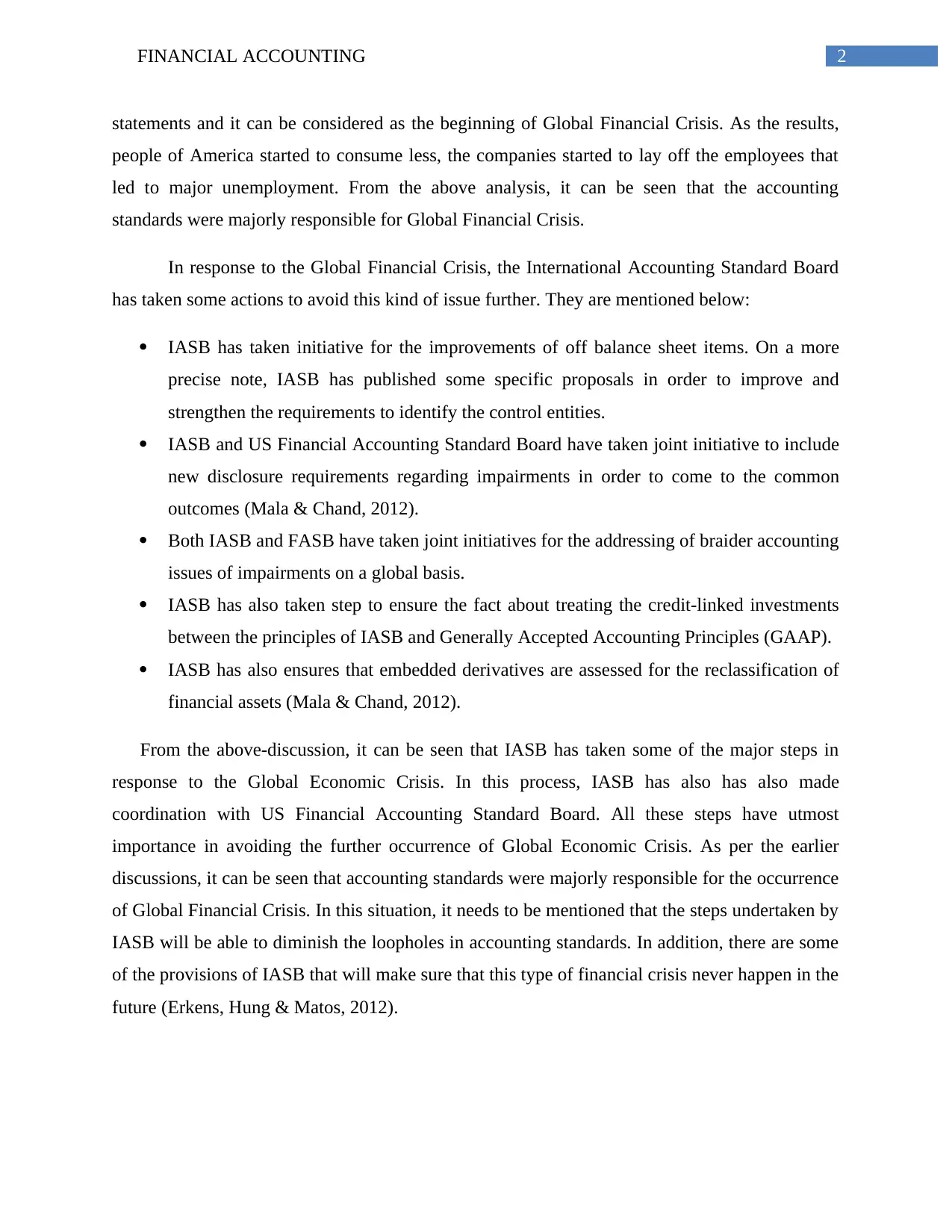
2FINANCIAL ACCOUNTING
statements and it can be considered as the beginning of Global Financial Crisis. As the results,
people of America started to consume less, the companies started to lay off the employees that
led to major unemployment. From the above analysis, it can be seen that the accounting
standards were majorly responsible for Global Financial Crisis.
In response to the Global Financial Crisis, the International Accounting Standard Board
has taken some actions to avoid this kind of issue further. They are mentioned below:
IASB has taken initiative for the improvements of off balance sheet items. On a more
precise note, IASB has published some specific proposals in order to improve and
strengthen the requirements to identify the control entities.
IASB and US Financial Accounting Standard Board have taken joint initiative to include
new disclosure requirements regarding impairments in order to come to the common
outcomes (Mala & Chand, 2012).
Both IASB and FASB have taken joint initiatives for the addressing of braider accounting
issues of impairments on a global basis.
IASB has also taken step to ensure the fact about treating the credit-linked investments
between the principles of IASB and Generally Accepted Accounting Principles (GAAP).
IASB has also ensures that embedded derivatives are assessed for the reclassification of
financial assets (Mala & Chand, 2012).
From the above-discussion, it can be seen that IASB has taken some of the major steps in
response to the Global Economic Crisis. In this process, IASB has also has also made
coordination with US Financial Accounting Standard Board. All these steps have utmost
importance in avoiding the further occurrence of Global Economic Crisis. As per the earlier
discussions, it can be seen that accounting standards were majorly responsible for the occurrence
of Global Financial Crisis. In this situation, it needs to be mentioned that the steps undertaken by
IASB will be able to diminish the loopholes in accounting standards. In addition, there are some
of the provisions of IASB that will make sure that this type of financial crisis never happen in the
future (Erkens, Hung & Matos, 2012).
statements and it can be considered as the beginning of Global Financial Crisis. As the results,
people of America started to consume less, the companies started to lay off the employees that
led to major unemployment. From the above analysis, it can be seen that the accounting
standards were majorly responsible for Global Financial Crisis.
In response to the Global Financial Crisis, the International Accounting Standard Board
has taken some actions to avoid this kind of issue further. They are mentioned below:
IASB has taken initiative for the improvements of off balance sheet items. On a more
precise note, IASB has published some specific proposals in order to improve and
strengthen the requirements to identify the control entities.
IASB and US Financial Accounting Standard Board have taken joint initiative to include
new disclosure requirements regarding impairments in order to come to the common
outcomes (Mala & Chand, 2012).
Both IASB and FASB have taken joint initiatives for the addressing of braider accounting
issues of impairments on a global basis.
IASB has also taken step to ensure the fact about treating the credit-linked investments
between the principles of IASB and Generally Accepted Accounting Principles (GAAP).
IASB has also ensures that embedded derivatives are assessed for the reclassification of
financial assets (Mala & Chand, 2012).
From the above-discussion, it can be seen that IASB has taken some of the major steps in
response to the Global Economic Crisis. In this process, IASB has also has also made
coordination with US Financial Accounting Standard Board. All these steps have utmost
importance in avoiding the further occurrence of Global Economic Crisis. As per the earlier
discussions, it can be seen that accounting standards were majorly responsible for the occurrence
of Global Financial Crisis. In this situation, it needs to be mentioned that the steps undertaken by
IASB will be able to diminish the loopholes in accounting standards. In addition, there are some
of the provisions of IASB that will make sure that this type of financial crisis never happen in the
future (Erkens, Hung & Matos, 2012).
⊘ This is a preview!⊘
Do you want full access?
Subscribe today to unlock all pages.

Trusted by 1+ million students worldwide
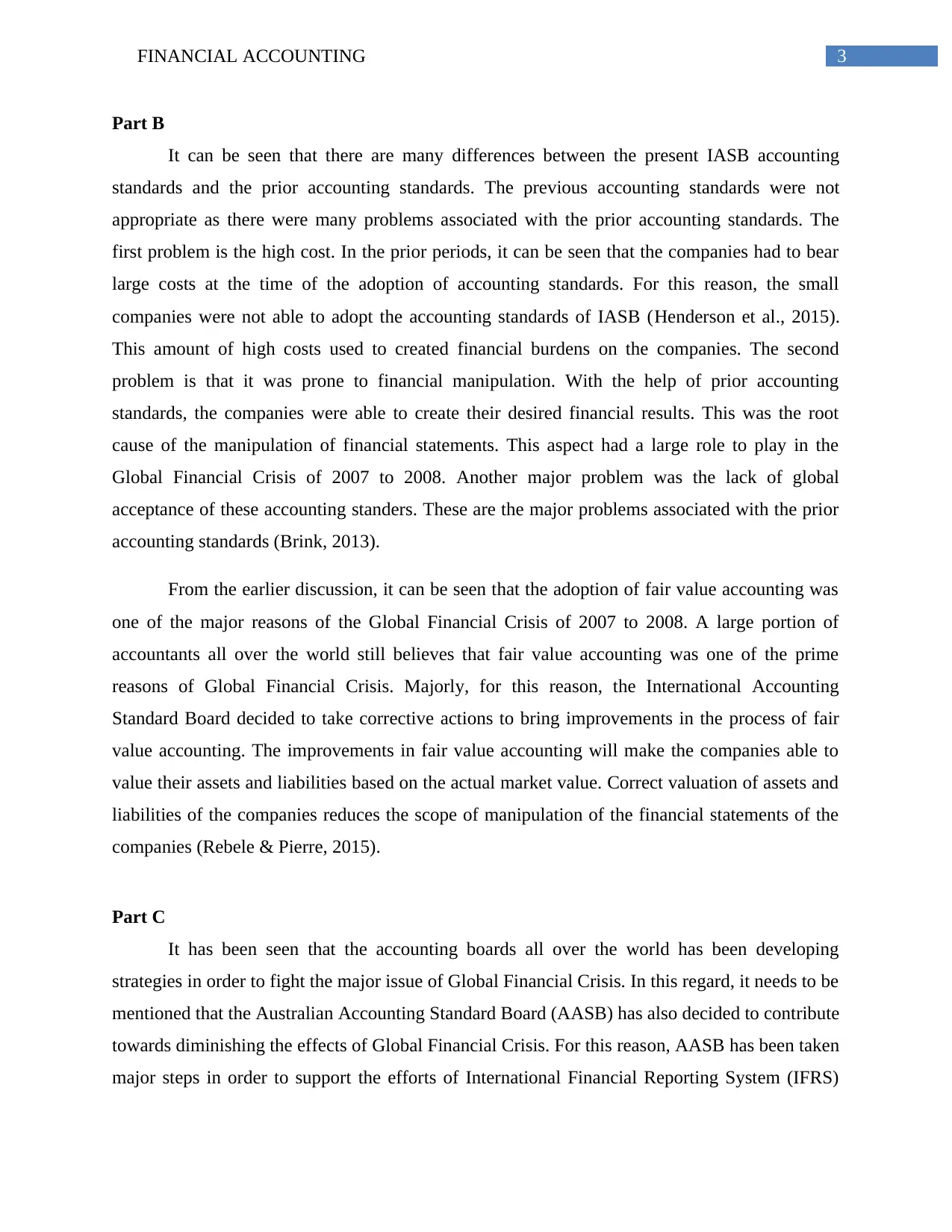
3FINANCIAL ACCOUNTING
Part B
It can be seen that there are many differences between the present IASB accounting
standards and the prior accounting standards. The previous accounting standards were not
appropriate as there were many problems associated with the prior accounting standards. The
first problem is the high cost. In the prior periods, it can be seen that the companies had to bear
large costs at the time of the adoption of accounting standards. For this reason, the small
companies were not able to adopt the accounting standards of IASB (Henderson et al., 2015).
This amount of high costs used to created financial burdens on the companies. The second
problem is that it was prone to financial manipulation. With the help of prior accounting
standards, the companies were able to create their desired financial results. This was the root
cause of the manipulation of financial statements. This aspect had a large role to play in the
Global Financial Crisis of 2007 to 2008. Another major problem was the lack of global
acceptance of these accounting standers. These are the major problems associated with the prior
accounting standards (Brink, 2013).
From the earlier discussion, it can be seen that the adoption of fair value accounting was
one of the major reasons of the Global Financial Crisis of 2007 to 2008. A large portion of
accountants all over the world still believes that fair value accounting was one of the prime
reasons of Global Financial Crisis. Majorly, for this reason, the International Accounting
Standard Board decided to take corrective actions to bring improvements in the process of fair
value accounting. The improvements in fair value accounting will make the companies able to
value their assets and liabilities based on the actual market value. Correct valuation of assets and
liabilities of the companies reduces the scope of manipulation of the financial statements of the
companies (Rebele & Pierre, 2015).
Part C
It has been seen that the accounting boards all over the world has been developing
strategies in order to fight the major issue of Global Financial Crisis. In this regard, it needs to be
mentioned that the Australian Accounting Standard Board (AASB) has also decided to contribute
towards diminishing the effects of Global Financial Crisis. For this reason, AASB has been taken
major steps in order to support the efforts of International Financial Reporting System (IFRS)
Part B
It can be seen that there are many differences between the present IASB accounting
standards and the prior accounting standards. The previous accounting standards were not
appropriate as there were many problems associated with the prior accounting standards. The
first problem is the high cost. In the prior periods, it can be seen that the companies had to bear
large costs at the time of the adoption of accounting standards. For this reason, the small
companies were not able to adopt the accounting standards of IASB (Henderson et al., 2015).
This amount of high costs used to created financial burdens on the companies. The second
problem is that it was prone to financial manipulation. With the help of prior accounting
standards, the companies were able to create their desired financial results. This was the root
cause of the manipulation of financial statements. This aspect had a large role to play in the
Global Financial Crisis of 2007 to 2008. Another major problem was the lack of global
acceptance of these accounting standers. These are the major problems associated with the prior
accounting standards (Brink, 2013).
From the earlier discussion, it can be seen that the adoption of fair value accounting was
one of the major reasons of the Global Financial Crisis of 2007 to 2008. A large portion of
accountants all over the world still believes that fair value accounting was one of the prime
reasons of Global Financial Crisis. Majorly, for this reason, the International Accounting
Standard Board decided to take corrective actions to bring improvements in the process of fair
value accounting. The improvements in fair value accounting will make the companies able to
value their assets and liabilities based on the actual market value. Correct valuation of assets and
liabilities of the companies reduces the scope of manipulation of the financial statements of the
companies (Rebele & Pierre, 2015).
Part C
It has been seen that the accounting boards all over the world has been developing
strategies in order to fight the major issue of Global Financial Crisis. In this regard, it needs to be
mentioned that the Australian Accounting Standard Board (AASB) has also decided to contribute
towards diminishing the effects of Global Financial Crisis. For this reason, AASB has been taken
major steps in order to support the efforts of International Financial Reporting System (IFRS)
Paraphrase This Document
Need a fresh take? Get an instant paraphrase of this document with our AI Paraphraser
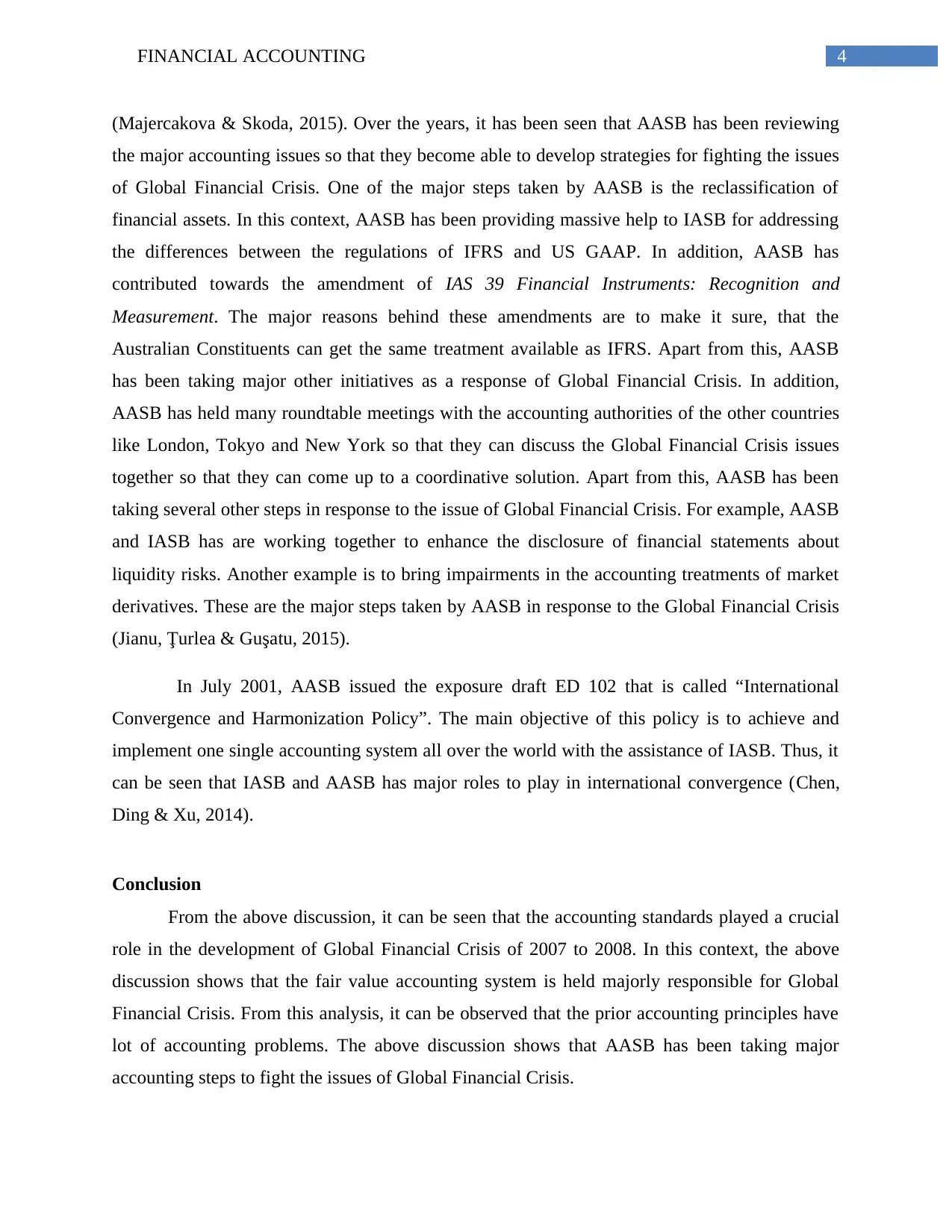
4FINANCIAL ACCOUNTING
(Majercakova & Skoda, 2015). Over the years, it has been seen that AASB has been reviewing
the major accounting issues so that they become able to develop strategies for fighting the issues
of Global Financial Crisis. One of the major steps taken by AASB is the reclassification of
financial assets. In this context, AASB has been providing massive help to IASB for addressing
the differences between the regulations of IFRS and US GAAP. In addition, AASB has
contributed towards the amendment of IAS 39 Financial Instruments: Recognition and
Measurement. The major reasons behind these amendments are to make it sure, that the
Australian Constituents can get the same treatment available as IFRS. Apart from this, AASB
has been taking major other initiatives as a response of Global Financial Crisis. In addition,
AASB has held many roundtable meetings with the accounting authorities of the other countries
like London, Tokyo and New York so that they can discuss the Global Financial Crisis issues
together so that they can come up to a coordinative solution. Apart from this, AASB has been
taking several other steps in response to the issue of Global Financial Crisis. For example, AASB
and IASB has are working together to enhance the disclosure of financial statements about
liquidity risks. Another example is to bring impairments in the accounting treatments of market
derivatives. These are the major steps taken by AASB in response to the Global Financial Crisis
(Jianu, Ţurlea & Guşatu, 2015).
In July 2001, AASB issued the exposure draft ED 102 that is called “International
Convergence and Harmonization Policy”. The main objective of this policy is to achieve and
implement one single accounting system all over the world with the assistance of IASB. Thus, it
can be seen that IASB and AASB has major roles to play in international convergence (Chen,
Ding & Xu, 2014).
Conclusion
From the above discussion, it can be seen that the accounting standards played a crucial
role in the development of Global Financial Crisis of 2007 to 2008. In this context, the above
discussion shows that the fair value accounting system is held majorly responsible for Global
Financial Crisis. From this analysis, it can be observed that the prior accounting principles have
lot of accounting problems. The above discussion shows that AASB has been taking major
accounting steps to fight the issues of Global Financial Crisis.
(Majercakova & Skoda, 2015). Over the years, it has been seen that AASB has been reviewing
the major accounting issues so that they become able to develop strategies for fighting the issues
of Global Financial Crisis. One of the major steps taken by AASB is the reclassification of
financial assets. In this context, AASB has been providing massive help to IASB for addressing
the differences between the regulations of IFRS and US GAAP. In addition, AASB has
contributed towards the amendment of IAS 39 Financial Instruments: Recognition and
Measurement. The major reasons behind these amendments are to make it sure, that the
Australian Constituents can get the same treatment available as IFRS. Apart from this, AASB
has been taking major other initiatives as a response of Global Financial Crisis. In addition,
AASB has held many roundtable meetings with the accounting authorities of the other countries
like London, Tokyo and New York so that they can discuss the Global Financial Crisis issues
together so that they can come up to a coordinative solution. Apart from this, AASB has been
taking several other steps in response to the issue of Global Financial Crisis. For example, AASB
and IASB has are working together to enhance the disclosure of financial statements about
liquidity risks. Another example is to bring impairments in the accounting treatments of market
derivatives. These are the major steps taken by AASB in response to the Global Financial Crisis
(Jianu, Ţurlea & Guşatu, 2015).
In July 2001, AASB issued the exposure draft ED 102 that is called “International
Convergence and Harmonization Policy”. The main objective of this policy is to achieve and
implement one single accounting system all over the world with the assistance of IASB. Thus, it
can be seen that IASB and AASB has major roles to play in international convergence (Chen,
Ding & Xu, 2014).
Conclusion
From the above discussion, it can be seen that the accounting standards played a crucial
role in the development of Global Financial Crisis of 2007 to 2008. In this context, the above
discussion shows that the fair value accounting system is held majorly responsible for Global
Financial Crisis. From this analysis, it can be observed that the prior accounting principles have
lot of accounting problems. The above discussion shows that AASB has been taking major
accounting steps to fight the issues of Global Financial Crisis.
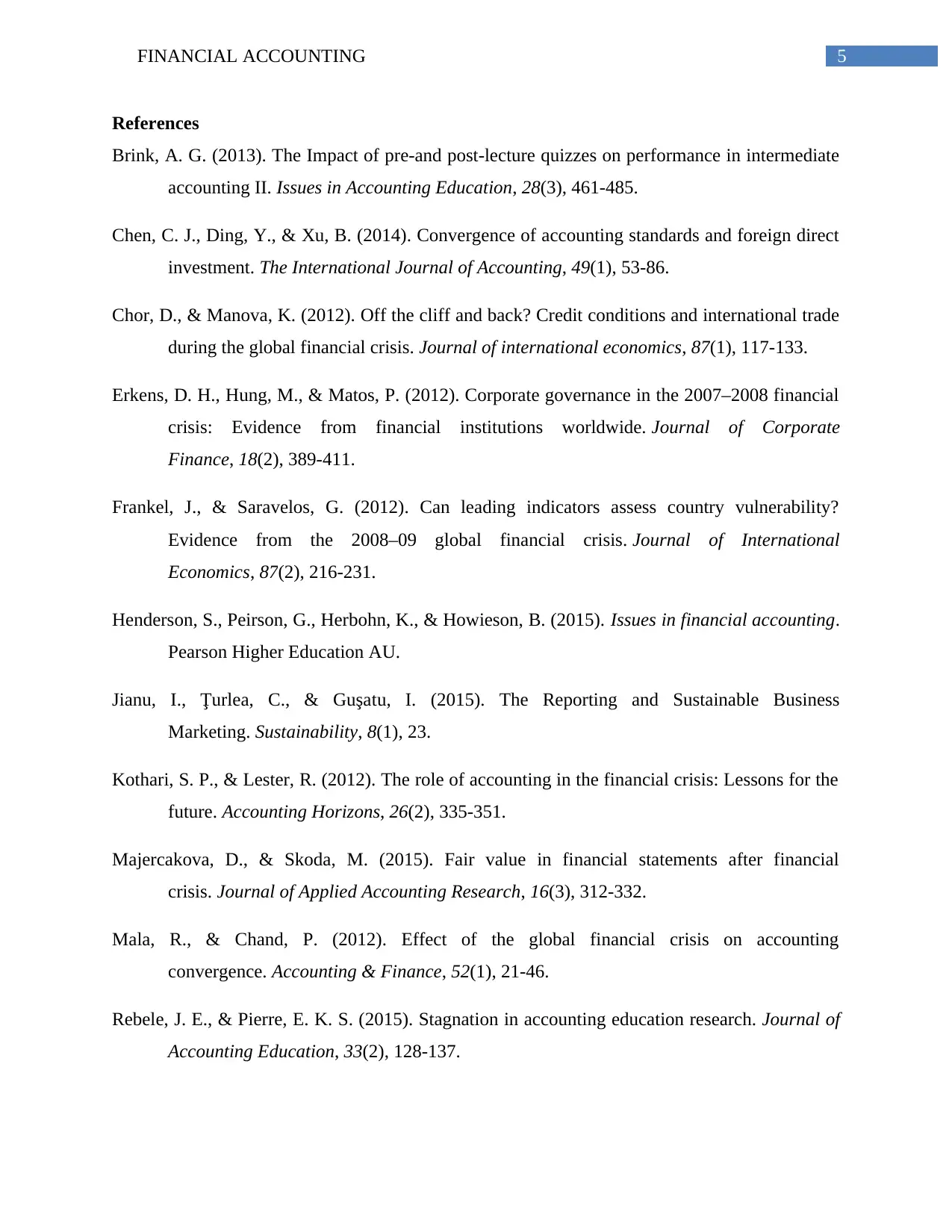
5FINANCIAL ACCOUNTING
References
Brink, A. G. (2013). The Impact of pre-and post-lecture quizzes on performance in intermediate
accounting II. Issues in Accounting Education, 28(3), 461-485.
Chen, C. J., Ding, Y., & Xu, B. (2014). Convergence of accounting standards and foreign direct
investment. The International Journal of Accounting, 49(1), 53-86.
Chor, D., & Manova, K. (2012). Off the cliff and back? Credit conditions and international trade
during the global financial crisis. Journal of international economics, 87(1), 117-133.
Erkens, D. H., Hung, M., & Matos, P. (2012). Corporate governance in the 2007–2008 financial
crisis: Evidence from financial institutions worldwide. Journal of Corporate
Finance, 18(2), 389-411.
Frankel, J., & Saravelos, G. (2012). Can leading indicators assess country vulnerability?
Evidence from the 2008–09 global financial crisis. Journal of International
Economics, 87(2), 216-231.
Henderson, S., Peirson, G., Herbohn, K., & Howieson, B. (2015). Issues in financial accounting.
Pearson Higher Education AU.
Jianu, I., Ţurlea, C., & Guşatu, I. (2015). The Reporting and Sustainable Business
Marketing. Sustainability, 8(1), 23.
Kothari, S. P., & Lester, R. (2012). The role of accounting in the financial crisis: Lessons for the
future. Accounting Horizons, 26(2), 335-351.
Majercakova, D., & Skoda, M. (2015). Fair value in financial statements after financial
crisis. Journal of Applied Accounting Research, 16(3), 312-332.
Mala, R., & Chand, P. (2012). Effect of the global financial crisis on accounting
convergence. Accounting & Finance, 52(1), 21-46.
Rebele, J. E., & Pierre, E. K. S. (2015). Stagnation in accounting education research. Journal of
Accounting Education, 33(2), 128-137.
References
Brink, A. G. (2013). The Impact of pre-and post-lecture quizzes on performance in intermediate
accounting II. Issues in Accounting Education, 28(3), 461-485.
Chen, C. J., Ding, Y., & Xu, B. (2014). Convergence of accounting standards and foreign direct
investment. The International Journal of Accounting, 49(1), 53-86.
Chor, D., & Manova, K. (2012). Off the cliff and back? Credit conditions and international trade
during the global financial crisis. Journal of international economics, 87(1), 117-133.
Erkens, D. H., Hung, M., & Matos, P. (2012). Corporate governance in the 2007–2008 financial
crisis: Evidence from financial institutions worldwide. Journal of Corporate
Finance, 18(2), 389-411.
Frankel, J., & Saravelos, G. (2012). Can leading indicators assess country vulnerability?
Evidence from the 2008–09 global financial crisis. Journal of International
Economics, 87(2), 216-231.
Henderson, S., Peirson, G., Herbohn, K., & Howieson, B. (2015). Issues in financial accounting.
Pearson Higher Education AU.
Jianu, I., Ţurlea, C., & Guşatu, I. (2015). The Reporting and Sustainable Business
Marketing. Sustainability, 8(1), 23.
Kothari, S. P., & Lester, R. (2012). The role of accounting in the financial crisis: Lessons for the
future. Accounting Horizons, 26(2), 335-351.
Majercakova, D., & Skoda, M. (2015). Fair value in financial statements after financial
crisis. Journal of Applied Accounting Research, 16(3), 312-332.
Mala, R., & Chand, P. (2012). Effect of the global financial crisis on accounting
convergence. Accounting & Finance, 52(1), 21-46.
Rebele, J. E., & Pierre, E. K. S. (2015). Stagnation in accounting education research. Journal of
Accounting Education, 33(2), 128-137.
⊘ This is a preview!⊘
Do you want full access?
Subscribe today to unlock all pages.

Trusted by 1+ million students worldwide
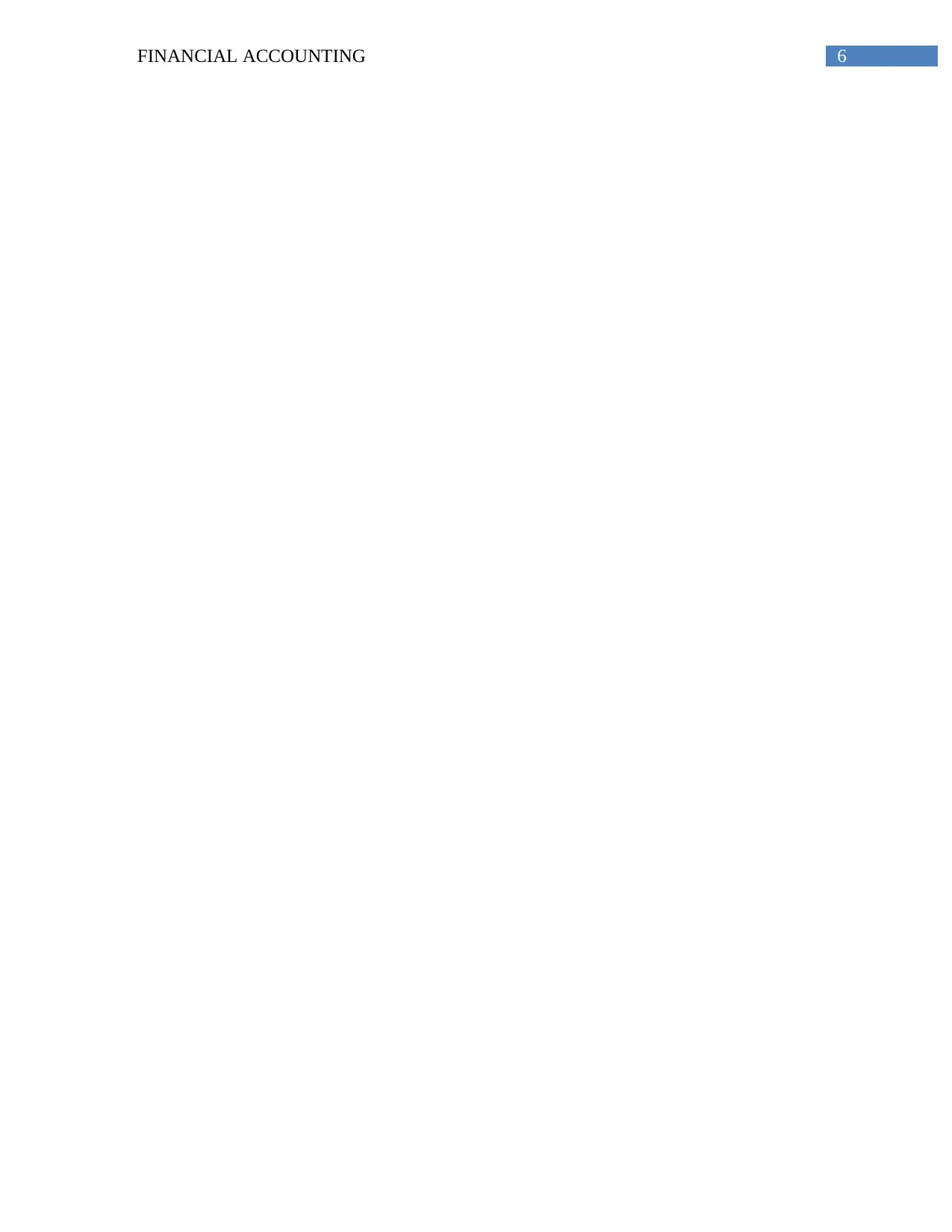
6FINANCIAL ACCOUNTING
1 out of 7
Related Documents
Your All-in-One AI-Powered Toolkit for Academic Success.
+13062052269
info@desklib.com
Available 24*7 on WhatsApp / Email
![[object Object]](/_next/static/media/star-bottom.7253800d.svg)
Unlock your academic potential
Copyright © 2020–2026 A2Z Services. All Rights Reserved. Developed and managed by ZUCOL.





